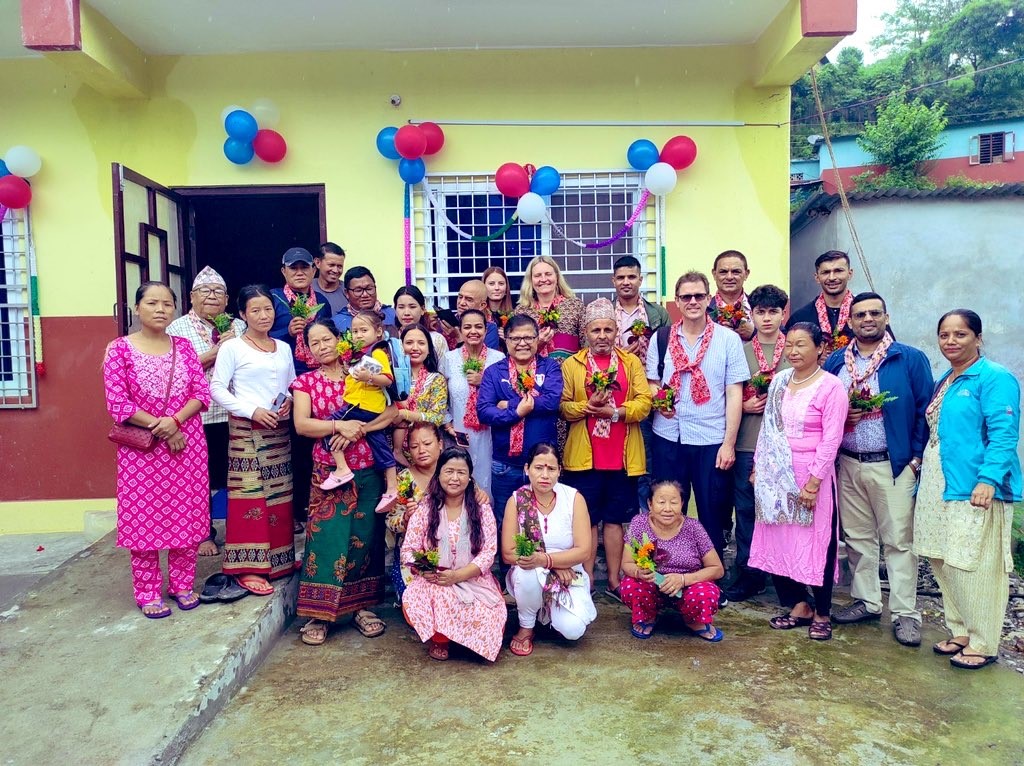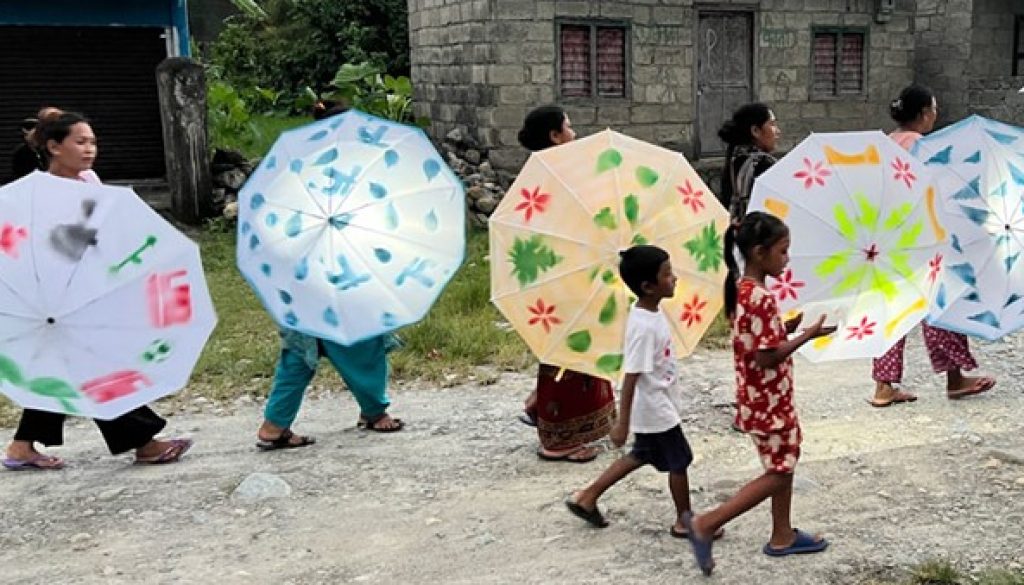Art as part of storytelling in community workshops in Nepal, with Luke Jerram
In August we had the privilege of once again working with internationally renowned artist Luke Jerram on another community project, this time in Nepal. Working alongside our partners at PHASE Nepal, Luke devised and delivered a workshop with a women’s community group in Khudikola informal settlement, Pokhara, Nepal. As part of the project Luke and our ARISE team visited three informal settlements in and around Pokhara. Here Luke shares his reflection from his time spent in these communities.
The first community we visited, Mathillo Ghotse, was a small village at the base of a valley which had a fast-flowing milky white river running through it. Single story houses had been built at random, made predominantly with breezeblock concrete walls and corrugated roofs. As we arrived down the hill, we passed a scene of children playing football on a waterlogged pitch, with cows on the field helping to create an extra wall of defence for the goalkeeper.

On our tour we spotted a few distilleries, where large saucepans of liquid boiled, creating a strong alcohol made from maize. Many villagers drink this alcohol, which is the root of numerous social problems within the community. One of the main forms of employment in the village at this time of year was pulling sand and gravel from the fast-flowing river. Young men and women scrape the mud from the riverbed by hand and filter it using nets and woven baskets. It is then carried on their backs to the edge of the river, ready for collection by lorries for use in the construction industry. Backbreaking work, villagers are paid £4 a day. Occasionally, we were told, the area would flood washing all their hard work away.


Presumably left unaccompanied by their parents as they worked, and with poor safety infrastructure around the river, some children had drowned in the river previous years. With funding and support from ARISE and Phase Nepal, a nursery and primary school with accompanying toilet block had been built for the village, providing care for the children during the day. Having only just been completed, with the walls and ceiling of the building still drying out, we were welcomed by the community and helped to launch this new building. While this is a huge development, there is still room for further improvements. The leaders suggested they would appreciate children’s playground in the garden area connected to the new building. Luke Jerram plans to support all three settlements he visited, through The Jerram Foundation, and has asked the community for a costed list of improvements they’d like to see.

The second settlement was Barahi Tole. As we arrived, we could see parts of the road had washed away. The foundations of an entire house had disappeared (presumably by a flood), leaving the corner of the property above dangling precariously, and starting to collapse. Some 50 chickens were sheltering from the heat of the day, beneath the foundations of the house in this newfound space. Subsidence in the village is a major problem, caused by the loose sand, gravel and small rocks that make up the landscape. ARISE and Phase Nepal has funded the completion of a community space. They provided funding for materials, and the community then built a community space, installing walls, windows, electrics and flooring. This new village hall will become a real asset and focal point for the village in the years to come.
The final informal settlement the team visited was Khudi Khola, an hour’s drive from Pokhara. Despite not being officially recognised by government authorities, the informal settlement did have a school at the top of the hill.
As in Malto Gosti many people make money by collecting and carrying baskets of boulders, gravel and sand up the steep river banks to sell to the construction industry (earning approximately 10p per basket). Some women in the village have suffered from pelvic organ prolapse, caused by the tension and damage to their bodies by this backbreaking work.




Everyone wanted the opportunity to work, to help their families and their community improve their situation. The words and ideas they shared were turned into imagery which then formed stencils used to decorate umbrellas. The workshop (using umbrellas), was designed specifically for the monsoon season! The umbrellas were then paraded by the group through the streets, accompanied by Nepali music.





All the tools, torches, art materials and umbrellas were donated to the community after the event. The children were delighted to be given pens and pencils to help with their schoolwork. There was a great cheer at the end, when we let the women’s group know we were also gifting them the sound system we used for the parade as well!
The women’s group have been asked to draw up a list of projects which could be deliverable by their community, if they were given investment to do so. Based on the findings of the research workshop The Jerram Foundation is now allocating funds, to deliver practical improvements in these communities.
Find out about other work undertaken with Luke Jerram through the ARISE project.
